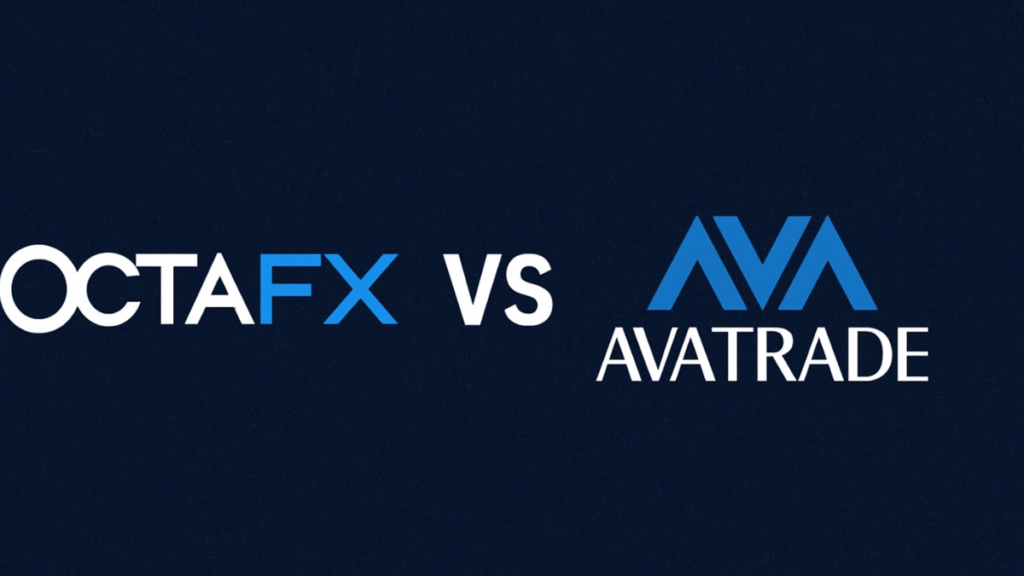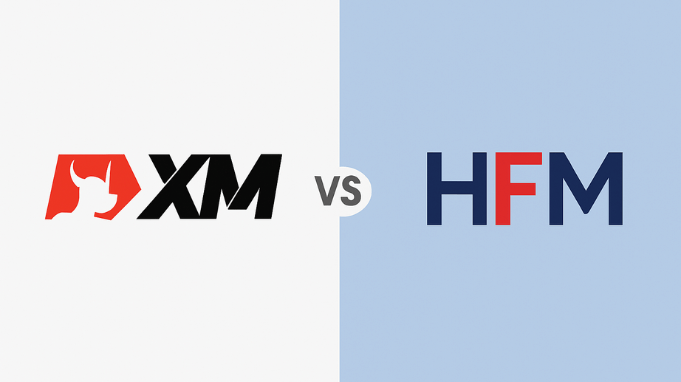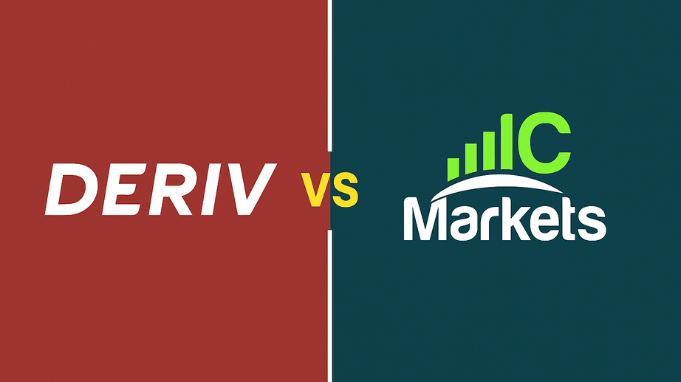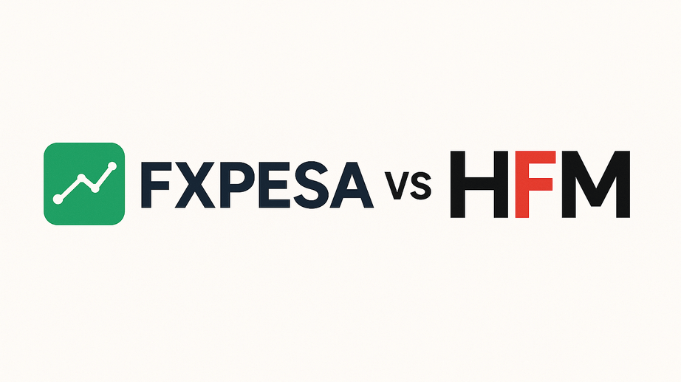When you’re choosing a broker, the decision between OctaFX vs AvaTrade can feel overwhelming — each promises attractive conditions, yet they differ significantly in many details. In this post, we’ll examine OctaFX vs AvaTrade in depth, so you, as a trader, can identify which fits your style, goals, and region best. We’ll compare key features, platforms, fees, and regulations, and give a real-world look at how things perform in practice.
This comparison is essential for traders because the broker you pick affects everything: your trading costs, available instruments, platform usability, withdrawal speed, support quality — and ultimately your profitability and risk. Picking the wrong broker might mean hidden costs, slow withdrawals or limited tools. On the other hand, choosing one that aligns with your style gives you a smoother, more professional trading experience.
Comparison Table
Here’s a side-by-side overview of OctaFX vs AvaTrade on key criteria.
| Element | OctaFX | AvaTrade |
| Features | Forex, CFDs on indices, commodities, crypto; copy-trading; MetaTrader 4 & 5. | Forex, CFDs on stocks, indices, commodities, crypto; proprietary platforms + MT4/5. |
| Fees & spreads | Spreads from around 0.6 pips on EUR/USD in some accounts. No deposit fee. | Spreads from ~0.6 pips on EUR/USD in standard accounts. Inactivity fees apply. |
| Platform types (desktop/web/mobile) | MT4, MT5, and OctaTrader platform. Web, desktop, mobile. | MT4, MT5, WebTrader, AvaTradeGo mobile app, proprietary options platform. |
| Regulations & security | Regulated by CySEC, FSCA South Africa, MISA etc in certain jurisdictions. | Regulated in multiple jurisdictions: ASIC (Australia), FSA (Japan), FSCA (South Africa), CBI (Ireland) etc. |
| Deposit & withdrawal methods | Bank wire, cards, e-wallets, crypto supported. Fast processing in many cases. | Similar: cards, bank wire, e-wallets, crypto in some cases; withdrawals may include inactivity/fee rules. |
| Minimum deposit | From around USD 25 in some jurisdictions. | Typically around USD 100 (may vary by entity). |
| Mobile app rating | Good mobile apps via MT4/5; OctaTrader has mobile versions. | Mobile app (AvaTradeGo) well designed; plus mobile for MT4/5. |
| ✅ Call to Action | Open account with OctaFX | Start trading with AvaTrade |
Brokers Overview
Platform usability and interface
OctaFX
OctaFX offers the familiar MetaTrader 4 (MT4) and MetaTrader 5 (MT5) platforms, which most forex traders already know. They also provide their proprietary “OctaTrader” platform.
From a usability perspective:
- The MT4/MT5 platforms are widely used, which means you’ll find plenty of tutorials, indicators and community help. This is favourable if you’re already familiar with them.
- OctaTrader aims to be more user-friendly for beginners: built-in trading ideas “feed”, simpler interface.
- Some traders report OctaFX platforms are responsive, with fast deposit and withdrawal features.
However:
- If you’re looking for advanced proprietary tools, social trading in depth, or unique features like options trading, OctaFX may feel more limited compared to larger brokers.
- Some UI elements may feel standard rather than cutting-edge; if you’re a power user you may find the platform a bit basic compared to bespoke proprietary platforms.
AvaTrade
AvaTrade also provides MT4 and MT5, which are excellent for traders who want familiarity and robust indicator support. Additionally, AvaTrade offers its own platforms (WebTrader, AvaTradeGo mobile) and unique tools, including the AvaOptions platform for currency options trading.
From a usability standpoint:
- The presence of proprietary platforms means you can access features beyond what MT4/5 standard offers—for instance, options trading, certain charting tools, and a polished UI.
- The mobile app (AvaTradeGo) is designed to be intuitive for traders on the go.
- Given the larger size of the broker, the infrastructure tends to be robust (server stability, execution quality), which is a plus.
However:
- With more features comes more complexity. Beginners might feel slightly overwhelmed by the range of platforms and options.
- Some users mention that the transition between different platforms (MT4/5 vs proprietary) may require a learning curve.
Case Example
Imagine you’re a trader in Nairobi who wants to trade EUR/USD and gold on your phone while commuting. With OctaFX, you could install the MT4 mobile app, get trading underway quickly because of the low minimum deposit (USD 25), and rely on a simple feed of trade ideas via OctaTrader. With AvaTrade: you might choose to install AvaTradeGo, benefit from mobile-optimized UI and perhaps drift into currency options trading over time. If you later decide to scale, the larger feature set of AvaTrade might suit you more – but it could initially feel more complex.
Verdict on usability & interface
If you prioritise simplicity, ease of use, quick start: OctaFX edges ahead. If you prioritise breadth of platforms, advanced tools and long-term scalability: AvaTrade wins. But both are strong.
Trading instruments available
OctaFX
OctaFX offers a range of forex currency pairs, commodities (like gold & silver), indices, and some cryptocurrencies.
Specifically:
- According to one review: “32 currency pairs, CFDs on energy resources, cryptocurrencies, indices, gold, and silver.”
- Another review mentions Octa’s offering of 300 instruments (though the exact list may vary by region) and highlights that stocks/ETFs are either limited or absent in certain jurisdictions.
- There are halal (swap-free) account options for traders wanting Sharia-compliant features.
Limitations:
- In many jurisdictions the number of available stocks, ETFs or bonds is limited or non-existent compared to full service brokers. For example one comparison noted “OctaFX has 0 stocks listed” in some cases.
AvaTrade
AvaTrade offers a significantly broader instrument set: forex, CFDs on stocks, indices, commodities, crypto, ETFs, bonds (in some jurisdictions) and currency options.
Details:
- AvaTrade supports over 1,000 assets vs. ~70 for OctaFX in a particular review.
- Example: “Trading markets: CFDs, Commodities, Cryptocurrencies, Forex, Indices” for AvaTrade.
- The ability to trade stock CFDs and other asset types gives greater diversification possibilities.
Trader scenario
If you are purely a forex trader — say EUR/USD, GBP/USD, JPY pairs — both brokers will suffice. But if you also want to trade, say, Tesla stock CFD, or bond CFDs, or more exotic currency options, AvaTrade gives you much more flexibility.
For example, A Kenyan trader might start with forex and gold via OctaFX to keep things simple and low cost. Later, if they want to branch into tech stock CFDs, or maybe use options to hedge a position, AvaTrade offers that path.
Verdict on trading instruments
For breadth and diversification, AvaTrade has a clear advantage. For simpler forex and commodity-focused trading with lower minimums, OctaFX remains competitive.
Account types and minimum deposit
OctaFX
- In many jurisdictions, OctaFX advertises minimum deposits as low as USD 25.
- Account types may include demo accounts, standard MT4/MT5 accounts, and OctaTrader-type accounts.
- For example, one review: “Minimum Deposit: $25” under OctaFX.
This low entry barrier is a plus for beginner traders or those with limited capital.
AvaTrade
- The minimum deposit is typically around USD 100 in many regions.
- Account types include: Standard accounts, perhaps professional accounts (depending on jurisdiction), options accounts etc.
- While USD 100 is still modest, it’s higher than OctaFX’s lowest deposit in some cases.
Implication
If you are just starting out and want to experiment with a small budget (say USD 50-100), OctaFX gives you more flexibility. On the other hand, if you have USD 500+ to invest and want a broker with more features and next-level services, starting with AvaTrade at USD 100 is still reasonable.
Case scenario
Suppose you have USD 200 to start with from Nairobi, and your focus is just forex and gold. With OctaFX, you can open an account, start trading, invest small amounts, and learn risk management. Later, if you decide to upgrade to broader instruments, you might switch or open a parallel account with AvaTrade.
Verdict on account types & minimum deposit
For low-cost entry: OctaFX wins. For “full-service” account types: AvaTrade is the stronger overall choice.
Fees, spreads, and commissions
OctaFX
- Reviewers report spreads as low as 0.6 pips on EUR/USD in some cases.
- OctaFX claims zero commission on many accounts (commission-free spread accounts).
- Deposit and withdrawal fees: Many regions charge no deposit fees; withdrawals are reportedly fast in many cases.
- However, some reviews mention spreads may widen depending on account, trading instrument, and market conditions; high leverage may come with higher trading risk.
AvaTrade
- Spreads reportedly start around 0.6 pips on EUR/USD in standard account types.
- Commissions: Many standard accounts appear commission-free (just spread). For advanced/pro accounts, the cost structure may differ.
- Other fees: Inactivity fee (for dormant accounts) is flagged for AvaTrade.
- Because of the broad instrument range, some instruments (stocks, options) will carry higher costs/spreads.
- While the spread on major forex pairs is competitive, when you go into exotic pairs, commodities, options the cost may increase.
Example breakdown
- If you trade EUR/USD with OctaFX and spread is 0.6 pips, on a 0.1 lot position this might cost less than USD 1 in spread cost (depending on lot size and value).
- If you trade the same with AvaTrade at 0.6 pips, cost is similar. But if you trade stock CFD or option, the cost may be higher with AvaTrade.
Hidden costs to watch
- Swap/overnight fees: Both brokers will charge swap rates when you hold positions overnight.
- Withdrawal or conversion fees: If you deposit in a non-USD currency, conversion costs may apply.
- Inactivity fees: AvaTrade has cited inactivity fee – something to note if you’re a low-activity trader.
- Execution quality: Spread is one thing; slippage and execution speed can add cost. Larger brokers with better infrastructure may reduce slippage.
Trader scenario
Imagine you trade 1 lot EUR/USD. With OctaFX you open and close quickly, spread maybe ~0.6 pips → cost maybe USD 6 (1 lot); AvaTrade same pair maybe similar cost. But if you want to trade Tesla stock CFD, with AvaTrade you may pay higher spread + commission than a simple forex pair with OctaFX. Also, if you don’t trade much and you leave the account idle for months, consider the inactivity fee possibilities.
Verdict on fees, spreads and commissions
Both brokers offer competitive spreads for major forex pairs. OctaFX has a slight edge for low-cost entry and simplicity. AvaTrade matches closely in forex, but for other instruments, you may incur more cost. If cost is your main criterion and you focus purely on major forex pairs, OctaFX wins. If you prioritise diversification and advanced trading tools, the slight extra cost with AvaTrade may be justified.
Regulations and security
OctaFX
- OctaFX is regulated in certain jurisdictions: e.g., by CySEC (Cyprus), FSCA (South Africa), MISA (Mauritius) depending on region. One recent review reports: “Regulated across multiple jurisdictions covering the EU and Asia.”
- However multiple sources caution: Their regulation may not be as broad or robust as some Tier-1 brokers and the entity you open account with may affect your regulatory protection.
- Key security features: Segregated accounts, negative balance protection in some cases (per review) for OctaFX.
AvaTrade
- AvaTrade holds multiple Tier-1 licences: For example, the review by FXScouts states: “AvaTrade holds three Tier 1 and one Tier 2 licences.”
- Licence authorities include: Australian Securities and Investments Commission (ASIC – Australia), Financial Services Commission (Ireland), Japan FSA, South Africa FSCA, British Virgin Islands FSC.
- Larger broker, more extensive regulatory oversight, stronger trust rating in comparison studies.
What this means for you
- A broker regulated by Tier-1 authorities (ASIC, FSA Japan, CBI Ireland) generally offers stronger oversight, better client protection (segregated funds, audit requirements, stricter rules) than less regulated brokers.
- Choosing which entity you open account with matters: Some brokers offer global reach via “offshore” entities with weaker regulation. Always check exactly which legal entity you’re signing up with.
- For Kenyan traders (or similar regions) you’ll want a broker that allows your country, provides reliable support, and whose regulatory regime you trust.
Scenario
If you deposit, say, USD 1,000 with OctaFX under a non-Tier-1 jurisdiction, you might face slightly higher risk (in theory) of weaker oversight. With AvaTrade, you may feel more confident that the funds are segregated and the broker is audited. That said, regulation doesn’t guarantee 100% protection but it improves trust.
Verdict on regulations & security
AvaTrade is ahead in this area thanks to stronger regulatory footprint and more comprehensive oversight. OctaFX is decent, but if regulation is your top priority (safety of funds, audit, oversight) AvaTrade wins.
Deposit and withdrawal speed
OctaFX
- According to user reviews: deposits are generally fast (instant via cards/e-wallets), and withdrawals “roughly 2 hours to get approved… once approved funds in bank/wallet within 30 minutes” in one test.
- They claim no deposit fee in many cases.
- However, withdrawal times may depend on region, verification status, currency conversion etc. Always check for your country (Kenya, say) whether local banking methods are supported.
AvaTrade
- Deposits and withdrawals supported by broad payment methods: cards, bank wire, e-wallets, crypto (in some regions).
- Some users mention that withdrawals may take 1-3 business days depending on method and region. Inactivity or verification issues may delay.
- Inactivity fees apply if the account is dormant.
Example
If you deposit USD 500 and want to withdraw profit back to your Kenyan bank account: With OctaFX you may use card/e-wallet and see funds in hours (subject to bank/responding region). With AvaTrade you might also deposit quickly, but withdrawal may involve bank wire, which can take a few days plus currency conversion costs. Additionally, if verification is incomplete (ID, utility bill, source of funds) you may face delays in both brokers.
Important tips
- Always verify your account (KYC) before trading — waiting until withdrawal can cause delays.
- Use payment methods supported for your country. Some brokers restrict certain deposit/withdrawal methods for specific locales.
- Check currency conversion: If you deposit in KES or withdraw to KES, conversion may add cost.
- Confirm withdrawal fee policy: Even if broker says “no withdrawal fee”, intermediary banks/local banks may charge.
Verdict on deposit & withdrawal speed
OctaFX appears slightly more favourable for quick deposits/withdrawals in many cases (especially via e-wallets) and low entry levels. AvaTrade is solid but may involve more steps/days depending on region. If withdrawal speed and ease is important to you, OctaFX has a slight edge.
Customer support quality
OctaFX
- The broker offers live chat, email, phone support in various languages (depending on region). One review mentions “fast deposits/withdrawals with no fees” which hints at decent support.
- However, some reviews point out that support responsiveness may vary depending on the region or account type. For example in comparison table: customer support score for OctaFX was 4.1 vs AvaTrade 4.6 (out of 5) in one review.
- As a mid-sized broker, support may be less extensive (fewer regional offices, fewer dedicated account managers) than very large brokers.
AvaTrade
- Given its size and global presence, AvaTrade tends to have a broader support network: multiple regional offices, multilingual support, various channels (phone, chat, email).
- The review gave AvaTrade customer support a higher rating (4.6) in one comparison.
- For Kenyan or African traders specifically, you’ll want to verify whether support covers your time-zone, local language, and payment methods.
Scenario
Suppose you attempt a withdrawal and the payment method gets flagged requiring extra documents. With AvaTrade you may get quicker escalation/resolution thanks to larger support team. With OctaFX you might still get support, but resolution might take a bit longer or require more back-and-forth.
Verdict on customer support quality
AvaTrade has a slight advantage in global support infrastructure, responsiveness and regional presence. OctaFX is acceptable, especially for basic inquiries, but may trail slightly in support responsiveness and regional adaptation.
Mobile app performance
OctaFX
- Offers mobile versions of MT4/MT5 and OctaTrader mobile. According to their site, the OctaTrader app aims for beginners with simple feed of ideas and mobile friendly UI.
- Reviewers state the deposit/withdrawal process on mobile is convenient.
- One note: As with many brokers when using MT4/5 on mobile you may find features slightly reduced compared to desktop (smaller charting, custom indicators limited). This is not unique to OctaFX, but worth noting.
AvaTrade
- The AvaTradeGo mobile app is designed specifically for mobile trading and is generally well rated. They also support mobile MT4/MT5 apps.
- Mobile performance: Given the scale of AvaTrade, the infrastructure (servers, apps) tends to perform reliably, which is important for mobile traders.
- Some users appreciate the ability to view larger selection of instruments via mobile, track positions, set alerts, use mobile-optimized interface.
Example
If you’re commuting and want to place a quick trade, set a stop loss and take-profit, monitor a gold position: With OctaFX you can pull up the OctaTrader mobile app or MT4, place the order. With AvaTrade you use AvaTradeGo – you may find more instruments and features (e.g., mobile alerts, news feed) built-in. If your mobile connection is less than optimal (e.g., in Nairobi), reliability of the app/network matters: larger brokers often have more robust connectivity.
Verdict on mobile app performance
Both brokers offer solid mobile apps. If you want simplicity and familiarity (MT4/5), OctaFX works well. If you want a dedicated mobile trading experience with enhanced features, AvaTrade slightly edges ahead.
Pros and Cons
Below are the pros and cons for each broker.
OctaFX – Pros
- Low minimum deposit (from around USD 25) makes it accessible to beginner traders.
- Competitive spreads on major forex pairs; commission-free accounts available.
- Simple, user-friendly platforms (MT4/5 + OctaTrader) good for beginners.
- Quick deposit/withdrawal in many cases; multiple payment methods including e-wallets and crypto.
- Additional features like halal (swap-free) accounts for traders wanting Sharia-compliant trading.
OctaFX – Cons
- Limited range of trading instruments (especially stocks, ETFs, advanced products) compared to larger brokers.
- Regulation footprint is less extensive than some top-tier brokers; oversight may vary by region.
- Support responsiveness may be slightly slower in certain regions; fewer regional offices.
- Some account features (e.g., advanced options, sophisticated tools) may be absent or less developed.
AvaTrade – Pros
- Strong regulatory oversight: multiple Tier-1 licences and broad global presence.
- Wide range of trading instruments: forex, stocks, commodities, crypto, options, ETFs in some regions.
- Professional-grade platforms and tools: MT4/5 plus proprietary platforms, mobile optimized, options trading.
- Better support and infrastructure thanks to scale; generally robust and reliable for serious traders.
- Good educational resources and diversified account types for different trading styles.
AvaTrade – Cons
- Minimum deposit slightly higher (USD 100) in many regions, which may be a barrier for micro-traders.
- Costs may be higher for certain instruments (stocks, options) or in some regions/trader segments.
- Complexity: With multiple platforms and instruments, beginners might feel overwhelmed at first.
- Inactivity fee risk: If you trade infrequently or leave account dormant, you might incur extra cost.
FAQ About OctaFX vs AvaTrade
Here are some frequently asked questions covering typical trader concerns:
Q1. Is OctaFX better than AvaTrade for beginners?
For absolute beginners with a small budget and primary focus on forex, OctaFX may be better because it offers a very low minimum deposit, simple platform options and decent spreads. However, if you want a broker you can grow into (more instruments, stronger regulation, advanced tools), AvaTrade may be the better pick long-term.
Q2. Which broker is safer for beginners, OctaFX or AvaTrade?
In terms of regulatory safety and institutional robustness, AvaTrade is the safer option: it holds multiple Tier-1 licences, has global presence and strong oversight. OctaFX is regulated too but the breadth of regulation and oversight is narrower in comparison.
Q3. Which broker offers lower trading costs, OctaFX or AvaTrade?
If you focus solely on major forex pairs, OctaFX arguably offers lower cost entry (low minimum deposit, commission-free accounts, competitive spreads). AvaTrade offers competitive spreads too, but when you expand to non-forex instruments you may face higher costs and additional fees (inactivity, instrument-specific costs).
Q4. Can I use mobile trading efficiently on both OctaFX and AvaTrade?
Yes — both brokers offer mobile apps (and support MT4/5 mobile). OctaFX offers a simpler interface which may be ideal for mobile beginners. AvaTrade offers more advanced mobile functionality (alerts, news feed, proprietary app) which may benefit traders on the move.
Q5. Does the minimum deposit differ significantly between OctaFX and AvaTrade?
Yes — OctaFX in many regions allows minimum deposits from around USD 25. AvaTrade often requires around USD 100 in many jurisdictions. If your budget is very small, this difference matters.
Q6. If I want to trade a broad range of assets (stocks, ETFs, bonds, options) which broker should I choose?
AvaTrade is the better choice for broad asset access: stocks, ETFs, currency options, and bonds in some jurisdictions. OctaFX is more limited in asset coverage (mainly forex, commodities, and indices, crypto in most cases).
Conclusion
Choosing between OctaFX vs AvaTrade ultimately comes down to your trading style, budget, goals, and risk appetite. If you’re just starting out, have a small trading capital, focus mainly on forex pairs, and want simplicity and low cost, OctaFX is a very good choice. You’ll benefit from low minimum deposit, familiar platforms, and relatively straightforward fee model.
On the other hand, if you’re looking to build a larger diversified trading portfolio, trade stocks, indices, commodities, crypto, and possibly options; if you value strong regulation, global support, and advanced tools — then AvaTrade is probably the better fit. Yes, you’ll start with a higher minimum and possibly somewhat higher cost on some instruments, but you’ll gain a broker with more room to grow.
Vincent Nyagaka is the founder of Chweya, where he breaks down complex financial topics into simple insights. A trader since 2015, he uses his market experience to help readers better understand investing, trading, and personal finance.



